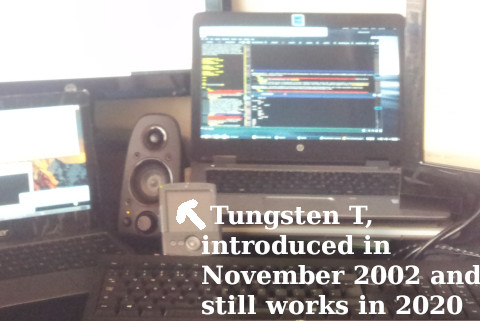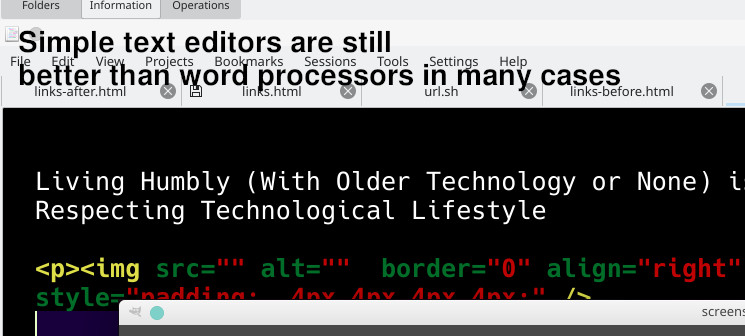

I still rely on unconnected Palm PDAs for note-taking (or voice memos) and it serves as well as it did 2 decades ago. That becomes problematic when they stop working and cannot be repaired/replaced.
THERE is an important correlation infrequently spoken about. It is a correlation between adoption of expensive or "latest" technology... with abuse of oneself. Whether it's "digital" (a.k.a. "smart") payments or something seemingly innocent and harmless like group chats, there's a hidden cost often completely unaccounted for. The reason group chats -- especially real-time video -- are difficult in a non-centralised (or decentralised fashion) is limit on bandwidth/throughput in any given network, not to mention computational barriers of home computers. It's different from peer-to-peer or end-to-end chats. It does not scale linearly. Similarly, digital payments may seem possible in theory but as scale grows (big growth), so do storage requirements (sometimes quadratically, not O(n)). The constraints imposed make so-called 'clown computing' alluring (a fluid allocation of resources, which can scale to meet growing needs).
"The "War on Cash" -- as we've repeatedly noted -- relies a great deal on demonisation and mischaracterisation."But where are we heading with all that?
Putting aside truly ridiculous metaphors such as "serverless", let's consider the topological ends. At the top we have rich 'suppliers' of computing resources, who increasingly refer to us "mere peons" as just "edges". They want us to broadcast data upwards (to their 'clowns') and pay the electric bill for surveillance, or (pre)processing of data to be transmitted upsteam.
Where are we now?
Well, many homes do not yet have lots of wiring (or even wireless) for spying. They're supposedly 'dumb' for not "getting on with the programme..."
 Putting aside the presence of several so-called 'phones' in many homes (even supposedly 'smart' ones with back doors), there's an effort underway to put permanent, always-on devices that are mostly immovable. Those are already being used to disseminate data not just to states but also to marketers. They make money that way, at the expense of tenants, but of course they keep jacking up the prices/rates again and again, regardless. Germany is apparently 'leading' in that regard; the push to install a bug in every home is in full swing. Here in the UK it can certainly not be imposed on anybody, certainly no sooner than 2024. Our energy supplier keeps robocalling people, repeatedly, to push them to abuse fellow tenants with mass surveillance (by misinforming and threatening them). They're also wasting company budgets on letters with fake "appointments" in them (to get installed those so-called 'smart' meters). The media likes to portray as "paranoid" those who resist it and sometimes it distorts, deliberately perhaps, the nature of the criticism (similar to the way 5G antagonists are branded as "COVIDiots"... as if the real argument against 5G is something about radio waves passing a virus around).
Putting aside the presence of several so-called 'phones' in many homes (even supposedly 'smart' ones with back doors), there's an effort underway to put permanent, always-on devices that are mostly immovable. Those are already being used to disseminate data not just to states but also to marketers. They make money that way, at the expense of tenants, but of course they keep jacking up the prices/rates again and again, regardless. Germany is apparently 'leading' in that regard; the push to install a bug in every home is in full swing. Here in the UK it can certainly not be imposed on anybody, certainly no sooner than 2024. Our energy supplier keeps robocalling people, repeatedly, to push them to abuse fellow tenants with mass surveillance (by misinforming and threatening them). They're also wasting company budgets on letters with fake "appointments" in them (to get installed those so-called 'smart' meters). The media likes to portray as "paranoid" those who resist it and sometimes it distorts, deliberately perhaps, the nature of the criticism (similar to the way 5G antagonists are branded as "COVIDiots"... as if the real argument against 5G is something about radio waves passing a virus around).
The "War on Cash" -- as we've repeatedly noted -- relies a great deal on demonisation and mischaracterisation. They paint so-called 'cashless' people as "Smart", whereas everyone else is a criminal (looking to hide crimes), dumb/backwards, dirty (sanitary aspects of demonisation have a dark, dark history), and uncaring about society (think of the children! Install contract-tracing!).
The narrative wars are potentially very effective. The antiwar movement being conflated with Hippies probably did not help, as if to oppose wars is to oppose capitalism itself. Some go as far as to compare people who pursue nationalised healthcare to socialists and bloodthirsty Marxists, as if to save poor people's lives (even when the financial incentive isn't there) is "bloodthirsty".
A lot of the videos I've watched lately portray activists for software freedom as relics and Luddites. The general premise it, people who reject the latest of something are borderline insane. In the GNU/Linux world we're often told that systemd antagonists are just "neckbeards" and people who prefer the command line (not choosing GUI over CLI) don't do so for expressive interfaces, which they can master and leverage for greater efficiency, but for anti-Establishment 'spite' or rebel-like mindset. ⬆